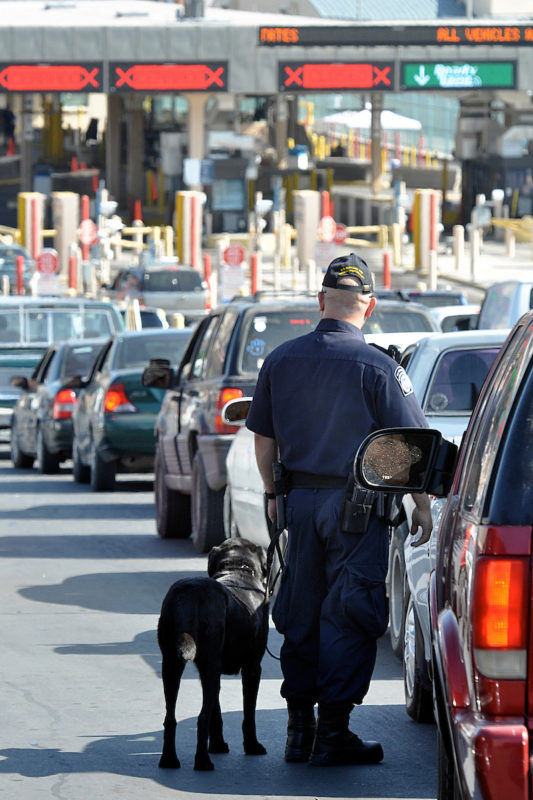 The Department of Homeland Security (DHS) has awarded the Texas A&M AgriLife Research-Institute for Infectious Animal Diseases (IIAD) a 10-year grant to lead its new Center for Excellence for Cross-Border Threat Screening (CBTS) and Supply Chain Defense. The Texas A&M Transportation Institute (TTI) and seven other Texas A&M University System entities, along with private- and public-sector partners from around the country, join IIAD as partners in the center.
The Department of Homeland Security (DHS) has awarded the Texas A&M AgriLife Research-Institute for Infectious Animal Diseases (IIAD) a 10-year grant to lead its new Center for Excellence for Cross-Border Threat Screening (CBTS) and Supply Chain Defense. The Texas A&M Transportation Institute (TTI) and seven other Texas A&M University System entities, along with private- and public-sector partners from around the country, join IIAD as partners in the center.
“Texas A&M looks forward to bringing together its expertise in many disciplines across the A&M System to deliver new, innovative technologies to reduce the risk of biological threat introduction across U.S. borders,” says Texas A&M University System Chancellor John Sharp.
The grant awarding the new center to Texas A&M was announced Oct. 1 and will include $3.85 million in funding for the first year. Joining TTI in the new center are A&M System team members:
- Texas A&M AgriLife Research and Extension Center at Weslaco.
- The Texas A&M School of Public Health.
- Texas A&M Health Science Center.
- Texas A&M College of Veterinary Medicine.
- Texas A&M Engineering Experiment Station.
- Texas A&M Engineering Extension Service.
- Texas A&M Galveston.
Other project partners include The University of Texas Medical Branch–Galveston, University of Washington, IBM Research, Quidel, Host Response and SunQ.
“This is the first time DHS has awarded a new Center of Excellence to an emeritus university,” explains Dr. Melissa Berquist, director of IIAD. Berquist will serve as the center’s director. “Drawing on 13 years of experience and lessons learned will allow CBTS to deliver agile, responsive and innovative solutions for DHS needs as a ‘think tank’ for research and workforce development solutions across the homeland security enterprise.”
The center’s purpose, as created by the Homeland Security Act of 2002: to supplement DHS’s own resources and experience with the best America’s universities can offer in terms of expertise and research capability. Center objectives will focus on:
- Developing and deploying technologies and operational methods to detect biological threats, including implementing blockchain technology to trace product movement along global supply chains.
- Establishing novel analytics to facilitate stakeholder decision making by integrating disparate data sources to improve threat assessment and future research, training and policy development.
- Leveraging private-public sector partnerships to enhance preparedness regarding biological threats via training for Homeland Security Enterprises personnel.
- Implementing next-generation threat identification methods and high-containment laboratory techniques to contain dangerous pathogens to support time-critical responses by DHS.
“Texas A&M AgriLife realizes the importance of developing protective measures related to both human and agricultural health as well as transport of products through global supply chain networks,” says Dr. Patrick Stover, vice chancellor for agriculture and life sciences at Texas A&M. “We are well positioned to lead this effort to deliver solutions and help secure the nation without compromising the pace and operational structures of commercial enterprises.”
TTI has experience working in over 40 countries, including 20 south of the U.S./Mexico border. The Institute enjoys a worldwide reputation for providing innovative solutions to a broad spectrum of transportation problems, from mobility to security to safety to the seamless integration of transportation modes.
“TTI’s previous research, demonstration projects, and deployments, along with the Institute’s strong working relationship with U.S. Customs and Border Protection (CBP) and other stakeholders, contributed to the success of the proposal,” TTI Executive Associate Director Dr. Katie Turnbull notes.
The Institute’s contribution to the center’s strategic objectives focus on supply-chain defense. Established relationships with DHS, CBP, the Federal Highway Administration, and various state departments of transportation provide TTI with a unique understanding of the strengths and weaknesses of the U.S. transportation network. For the center, TTI’s research will use a combination of blockchain technology and sensors to create an immutable, auditable and traceable supply chain of data to trace product movement.
“I can think of no better example of the benefits of well-coordinated, applied research than the DHS Centers of Excellence,” states TTI Agency Director Greg Winfree. “The centers break down silos, step across organizational boundary lines and encourage team members to work together. TTI is proud to be a part of this new center, and we look forward to working with our partners to better protect Americans nationwide.”